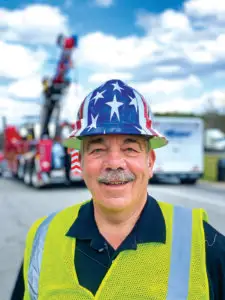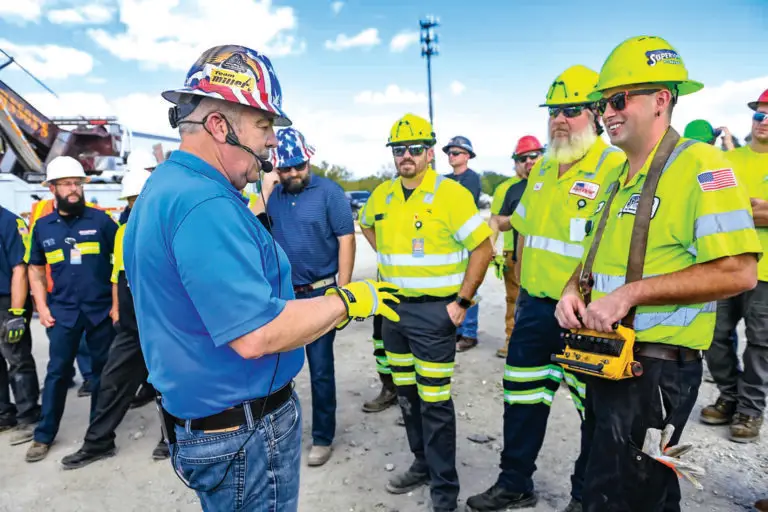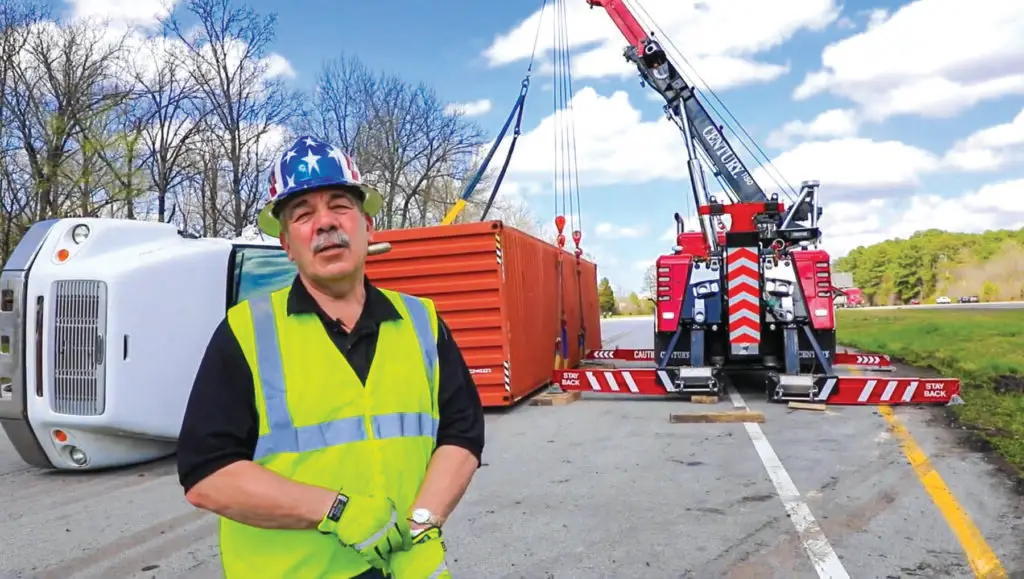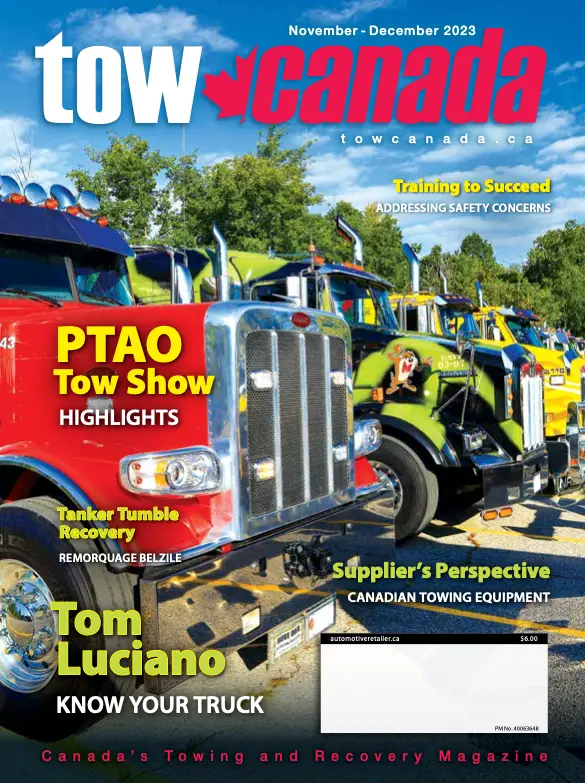Cover Photo: A snapshot from Miller Industries’ educational video, where Tom Luciano demonstrates an effective technique for conducting a reverse roll with a container/truck casualty, utilizing a Century 1150 rotator. Photo courtesy of Miller Industries
When it comes to being the best in industry, Tom Luciano of Miller Industries stresses the importance of knowing the design of your truck, its intended uses, and why it is built the way it is.
by Sarah Bruce
It all started back in high school when Tom Luciano worked a part-time job at a local service station where they had tow trucks in the local town.
“One Saturday the phone rang, and it was the police department,” Tom said. “They had a two-car accident, and they needed two tow trucks. I called the gentleman on-call, and he said, ‘On my way, lock the building up, you’re going with me to drive the second tow truck.’ So, life changed that day for me and I ended up winching one of the cars out of the ditch. After that day, I would always say to my friends, ‘I’m going to change the world in towing and recovery, somehow, some way.’”
The opportunity to do just that came along when President Jeff Badgley offered Tom a job at Miller Industries in late 1996, where he works to this day as a subject matter expert (SME). It has taken him all over the world, demonstrating, educating, and advising owners and operators on towing and recovery equipment. Tom also works Internationally with the Miller Export Division, which handles export sales and military-grade towing and recovery equipment. Working on the manufacturer side of the towing and recovery industry has given Tom a different perspective on what advice he would offer to the owners and operators he often works with.

“It’s no secret that the key to success in the towing and recovery industry is education,” Tom said. For the manufacturer, this means understanding each buyer’s needs. “Awareness, maintaining equipment, and good mechanical knowledge is the education our industry needs. This comes in many different forms.” There are several programs in the industry that instruct the fundamentals of towing and recovery, but they do not necessarily take a specific approach when it comes to the truck/chassis, the type of heavy-duty equipment, and its essential maintenance procedures.
“Back in 2004-06, our distributer network normally conducted the deliveries of new units,” Tom said. “They’d deliver a heavy-duty to a customer, but most salesmen are not trained operators knowing all aspects of maintenance, or how to tow and recover. So, when it came to the rotator, we at Miller would normally assist in most deliveries, and it meant travelling quite a bit.”
"We realized we should have customers come to our factory because seeing is believing.”
Knowing there had to be a better way to convey pertinent knowledge about the heavy-duty units they were selling, a few at Miller came together to brainstorm, Tom explained. “We find it hard to do seminars on the road at different locations because of major requirements, which involve Miller equipment, needing casualties—such as a semi-trucks, dozers, and garbage trucks for demonstrations—and an uneven parking lot. We realized we should have customers come to our factory because we could control the environment better.”
This is why Miller Industries began offering product familiarization classes (PFC). “This allows us to take students through our main plant and see how our units are made and assembled,” Tom said. “What we try to do is give you the mechanical knowledge to understand the unit you’re operating and how it’s designed to be used.”
Visitors, owners, and operators “will get the chance to ask any questions they may have about electrical, hydraulics, hoses, and valves that are hydraulicly plumbed, how the units are built and assembled, and demonstrate a certified lift in our test pit. We then have an opportunity to demonstrate to students how to rig and position a recovery unit to upright a loaded tractor trailer and mixer. The ‘Ring Leaders’ is the name we gave our rotator seminars so it wouldn’t be just another heavy-duty training session given by everyone else.
“Going to the factory you’re going to learn the ‘hows and whys’,” said Tom. “When touring our factory, it becomes an education from the manufacturer. We give the owner/operator an opportunity to know their unit inside out, to know why a gusset was put here and why a weld was put there and what yield strength steel is used in manufacturing your specific unit. You’ll learn about the air pressure setting of your winch, your winch wire rope working load limits, snatch block uses, and the compression loads imposed on the unit. You will also learn why the boom or wheel lift is designed the way it is.
“We also conduct factory and some dealer-level product familiarization classes. We tie in maintenance, design, safety, rigging, and demonstrations of how to approach actual recovery scenarios. We are trying to mitigate warranty claims on our equipment. There’s so much behind the scenes that people don’t realize.”
Tom also talked about the importance of sending the right people to these seminars at the right time. “The owners usually want to come to the PFC seminar we are giving right after a purchase of a unit. However, it is much better to operate the unit for 8 to 12 months before attending. Very often, the wrong person is attending our rotator seminars because the owner isn’t always the one operating the truck. They’re paying an employee to operate that half-a-million-to-million-dollar recovery unit, and they end up damaging it because they don’t have the fundamental expertise of how that recovery unit was to be used.”
No two manufacturers’ units are designed the same, Tom explained. “No matter what you sell in life, there are competitors, and in the heavy-duty market, there are several companies that make towing equipment. The rigging knowledge and how operators decide to upright that casualty also have a lot to do with what kind of equipment they are using. The performance of a Miller rotator and another manufacturer’s rotator are not the same machines. Please do not do with our Miller rotators what a different manufacturer told you to do with theirs.
What we try to do is give you the mechanical knowledge to understand the unit you’re operating and how it’s designed to use.”
“This is why it’s important for an operator to understand the exact specifications of the machine they’re operating. For example, boom ratings, retracted and extended, should be SAE (Society of Automotive Engineers) rated, not MTG (Manufacturing) rated. For whatever reason, so many operators and owners don’t understand leverage or know how to use or set them up properly.”
During the COVID-19 pandemic, when in-person training seminars were put on hold, Miller’s marketing team opted to go online to continue with their “Brainstorming with the Pros” seminars. Miller used this format at tow shows in the past, and it seemed like the right way going forward.

“People would register, and we would let them log in and have online HD Recovery Seminars monthly. This idea even got better, as towing company owners used this as an ‘in-house training’ for many of their company people. They would buy some pizzas and drinks and hold round table discussions in their office while viewing the recovery jobs we were discussing. The forum we used was formatted so you could raise your hand and, when called on, you could ask the question to all attending so everyone online could hear the question and the answer. This was a huge success, and we even had people from overseas attending. The small charge we collect from attendees went to the towing association they were a member of, or their choice, just like how all extra funds from each of our ‘Ring Leader’ Rotator Classes is donated to the International Towing Museum’s Survivor Fund.”
With all that being said, Tom believes in the importance of receiving an education from as many sources as possible. “Don’t get branded in training seminars by instructors or names of the seminars. If you truly want an education, you should go to seminars given by quality instructors everywhere. Pick up the best of the instructor’s area of expertise out there because each one might have points you will use and relate to in your daily work.”
Miller Industries heavy-duty PFC seminars can be attended in Ooltewah/Chattanooga, Tennessee, where Miller Manufacturing is based. Miller believes education is much needed because customer needs and the equipment they are using is all unique. Not all equipment is the same, and not all training seminars deliver the same information. 🍁

